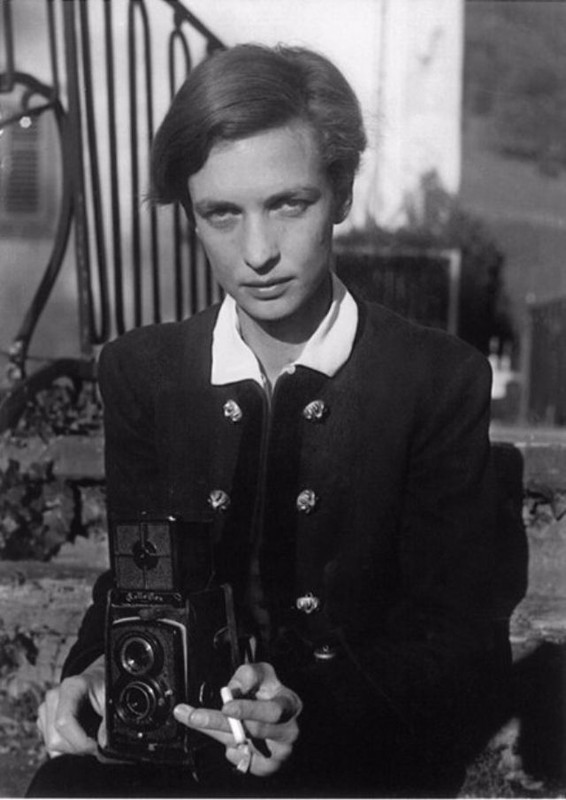Take a photo of a barcode or cover
"Truly, I only live when I write."
—Annemarie Schwarzenbach
To come up with the review of a book that left you mad, gasping, yearning, famished, hungry and starved of love, is challenging. Annemarie Schwarzenbach's brilliant piece of a 1930s or 40s lesbian love story, set in Berlin, is a commemorative and disjunct work of woeful love that tears one to shreds. The author was prompted by her lover Ursula Von Hohenlohe to pen the enamouring saga of unreciprocated romance with a personal, unique touch.
This story is set with nature as its backdrop. Nature is being hunted down by humans and ravaged by World wars. Thus, a war-torn Berlin seems to be the chaos brimming in the heart of the unnamed female narrator. The earth's "crack" symbolises the lover's ache drowning in the ocean of unrequited love. Its painful, bone-crushing and doesn't let the reader to catch a breath while reading the book.
Following a meta-narrative approach, it constantly switches between past and present like undulating waves. Sibylle, a variete actress and dancer is the obsessive love of the narrator struggling with crippling depression and gastritis (at least according to my diagnosis). The entire narration takes place with the narrator trying to come to terms with her detached lover. I feel that the autobiographical semblance of the withdrawal symptoms of a morphine addict (the narrator) have also been portrayed in the novel with vivid details.
This book also seems to have autobiographical elements in it, specified in the Translator's note and the Afterword:
"She [the author] hid her homosexuality by forcing herself into a corset of gender norms, perhaps hoping to reach a wider audience. An openly lesbian love story would certainly not have been published by Rowohlt Verlag at the time." (Roger Perret)
Again in the translator's note it is mentioned:
"She too, like the young man [later claimed by the author that the narrator is a woman] in 'Lyric Novella', spent her life fleeing and trying to find solace, often in foreign places and nature."
Alluding to the fact that "Schwarzenbach made no secret of her homosexuality" (Lucy Jones), her personal experiences with Lesbianism are duly enmeshed in the novel. Her mother raised her like a son (might seem liberating but its not as one needs to understand that to achieve freedom from societal norms, you need not dress up or pretend to be a man, unless of course you inherently choose to). She also had a very troubled relationship with her mother as Roger Perret mentions, "Schwarzenbach offered up her pain—in the role of the 'suffering cavalier'—like roses to her mother." Perret further elucidates, "Tormented by this moral dilemma [of extreme loneliness and self-sacrifice], Schwarzenbach's only escape lay in suffering, in drug-induced intoxication and in writing." Her mother had even sent her to a school in "remote Ftan" because of her "intense infatuation for another girl." Perret exemplifies that the author was "thereafter closely watched by her family every time she tried to make friends outside her domestic circle." Even her letters to her girlfriend-cum-"second mother", Erika were destroyed by Renee (Schwarzenbach's mother). She also burnt "part" of her daughter's works. The deletion of parents from the novella also seemed like an autobiographical trope to me.
An interesting fact about this queer icon is that she frequently visited lesbian bars. I found this fact interesting and courageous in a society where homosexuality was not well received.
To conclude, 'Lyric Novella' displays the fragmented lyric beating in the trampled heart of a lovelorn narrator.
—Annemarie Schwarzenbach
To come up with the review of a book that left you mad, gasping, yearning, famished, hungry and starved of love, is challenging. Annemarie Schwarzenbach's brilliant piece of a 1930s or 40s lesbian love story, set in Berlin, is a commemorative and disjunct work of woeful love that tears one to shreds. The author was prompted by her lover Ursula Von Hohenlohe to pen the enamouring saga of unreciprocated romance with a personal, unique touch.
This story is set with nature as its backdrop. Nature is being hunted down by humans and ravaged by World wars. Thus, a war-torn Berlin seems to be the chaos brimming in the heart of the unnamed female narrator. The earth's "crack" symbolises the lover's ache drowning in the ocean of unrequited love. Its painful, bone-crushing and doesn't let the reader to catch a breath while reading the book.
Following a meta-narrative approach, it constantly switches between past and present like undulating waves. Sibylle, a variete actress and dancer is the obsessive love of the narrator struggling with crippling depression and gastritis (at least according to my diagnosis). The entire narration takes place with the narrator trying to come to terms with her detached lover. I feel that the autobiographical semblance of the withdrawal symptoms of a morphine addict (the narrator) have also been portrayed in the novel with vivid details.
This book also seems to have autobiographical elements in it, specified in the Translator's note and the Afterword:
"She [the author] hid her homosexuality by forcing herself into a corset of gender norms, perhaps hoping to reach a wider audience. An openly lesbian love story would certainly not have been published by Rowohlt Verlag at the time." (Roger Perret)
Again in the translator's note it is mentioned:
"She too, like the young man [later claimed by the author that the narrator is a woman] in 'Lyric Novella', spent her life fleeing and trying to find solace, often in foreign places and nature."
Alluding to the fact that "Schwarzenbach made no secret of her homosexuality" (Lucy Jones), her personal experiences with Lesbianism are duly enmeshed in the novel. Her mother raised her like a son (might seem liberating but its not as one needs to understand that to achieve freedom from societal norms, you need not dress up or pretend to be a man, unless of course you inherently choose to). She also had a very troubled relationship with her mother as Roger Perret mentions, "Schwarzenbach offered up her pain—in the role of the 'suffering cavalier'—like roses to her mother." Perret further elucidates, "Tormented by this moral dilemma [of extreme loneliness and self-sacrifice], Schwarzenbach's only escape lay in suffering, in drug-induced intoxication and in writing." Her mother had even sent her to a school in "remote Ftan" because of her "intense infatuation for another girl." Perret exemplifies that the author was "thereafter closely watched by her family every time she tried to make friends outside her domestic circle." Even her letters to her girlfriend-cum-"second mother", Erika were destroyed by Renee (Schwarzenbach's mother). She also burnt "part" of her daughter's works. The deletion of parents from the novella also seemed like an autobiographical trope to me.
An interesting fact about this queer icon is that she frequently visited lesbian bars. I found this fact interesting and courageous in a society where homosexuality was not well received.
To conclude, 'Lyric Novella' displays the fragmented lyric beating in the trampled heart of a lovelorn narrator.
4 stars mainly for the epilogue / historical context that put the story in place.
Spotting Thomas Mann’s name in the afterword and the year this novella was first published (1933) I was lured to pick Lyric novella from the shelf with new books in the local library. This slender book seemed to fit perfectly into a fresh Sunday morning ritual, consisting of reading a slim volume in bed while drinking coffee before the children are awake.
The afterword of the novella turned out more captivating than the rather sentimental story on unrequited love and obsession of a well-to-do law student getting lost in night life and addiction, risking to ruin a budding brilliant diplomatic career set out for him by his family for a mysterious night club singer surrounded by shady figures and secrets.
The brief life of the Swiss writer, journalist and photographer Annemarie Schwarzenbach (1908-1942) still seems to fire the imagination. Living most of her life abroad, she became close to Erika and Klaus Mann; Thomas Mann called her ‘a ravaged angel’. From the many glamourous black and white pictures and fragments dedicated to her which document her life it is not so hard to imagine how she acquired a cult status: living a bohemian and adventurous life, having relationships with several women, travelling to the United States, Persia and Afghanistan, taking an antifascist stance against her pro-Nazi wealthy family, addicted to morphine, inspiring a passion in Carson McCullers – and dying young.

Tantalizing and foreboding as the 1933 Berlin setting of the novella at first glance might look, the brief account in short chapters of the obsession with the cold and distant cabaret singer Sibylle juxtaposed and contrasted to the salutary reflective hours the narrator spends in solitude in nature however struck me as hackneyed and lacklustre - the later twist that Annemarie Schwarzenbach gave to the story by revealing after publication that the unnamed narrator is not a young man but a woman (so feeding the impression that the novella drew at least partly on her own life (and her infatuation with Erika Mann)) cannot save the story from its aftertaste of triviality. Atmospheric, elegiac in tone and lyrically written it might be, the contemplations of the narrator on lovesickness, fear of commitment and appending loneliness didn’t catch me as particularly acute, moving or revelatory.
If there is any silver lining to Schwarzenbach’s novella, it is that it reminded me of the invigorating Berlin cabaret song Das Lila Lied as sung by the ravishing Ute Lemper.
(** 1/2 )
The afterword of the novella turned out more captivating than the rather sentimental story on unrequited love and obsession of a well-to-do law student getting lost in night life and addiction, risking to ruin a budding brilliant diplomatic career set out for him by his family for a mysterious night club singer surrounded by shady figures and secrets.
The brief life of the Swiss writer, journalist and photographer Annemarie Schwarzenbach (1908-1942) still seems to fire the imagination. Living most of her life abroad, she became close to Erika and Klaus Mann; Thomas Mann called her ‘a ravaged angel’. From the many glamourous black and white pictures and fragments dedicated to her which document her life it is not so hard to imagine how she acquired a cult status: living a bohemian and adventurous life, having relationships with several women, travelling to the United States, Persia and Afghanistan, taking an antifascist stance against her pro-Nazi wealthy family, addicted to morphine, inspiring a passion in Carson McCullers – and dying young.

Tantalizing and foreboding as the 1933 Berlin setting of the novella at first glance might look, the brief account in short chapters of the obsession with the cold and distant cabaret singer Sibylle juxtaposed and contrasted to the salutary reflective hours the narrator spends in solitude in nature however struck me as hackneyed and lacklustre - the later twist that Annemarie Schwarzenbach gave to the story by revealing after publication that the unnamed narrator is not a young man but a woman (so feeding the impression that the novella drew at least partly on her own life (and her infatuation with Erika Mann)) cannot save the story from its aftertaste of triviality. Atmospheric, elegiac in tone and lyrically written it might be, the contemplations of the narrator on lovesickness, fear of commitment and appending loneliness didn’t catch me as particularly acute, moving or revelatory.
If there is any silver lining to Schwarzenbach’s novella, it is that it reminded me of the invigorating Berlin cabaret song Das Lila Lied as sung by the ravishing Ute Lemper.
(** 1/2 )
i am excited to read more about her life in death in persia (next!)
emotional
reflective
sad
medium-paced
dark
mysterious
reflective
sad
fast-paced
Plot or Character Driven:
Character
Strong character development:
No
Loveable characters:
Complicated
Diverse cast of characters:
No
Flaws of characters a main focus:
Yes
Zwei Passagen aus dem Epilog, die mein Empfinden ganz gut widerspiegeln:
»Ich liebe nur die Sprache eines Buches. Es können triviale Dinge darin stehen, oder besser: gar nichts. Ich will keine Protokolle. Auch Taten sind gleichgültig: Die will ich selber erleben oder selber tun.« Diese Aussage liest sich wie eine vorweggenommene Replik auf die später oft geäusserte Kritik, ihre Werke seien handlungsarm und oberflächlich.
So wie die Liebe in den Texten der A.S. wenig Entwicklung zeigt, so statisch sind auch viele ihrer Figuren. Vor lauter Rücksicht auf andere kommen sie, wie die Autorin, nicht zu sich selbst, werden fast starr vor Trauer über das fehlende Lebensglück. Und gleichzeitig wollen sie diese Leere, diesen Zustand der Ohnmacht, weil sie in ihrer Klage darüber die Stimme des Lebens umso stärker zu vernehmen meinen."
Trotzdem mochte ich den Ton sehr, es liegt eine große Melancholie über allem und eine unabwendbare Tragik.
Two passages from the epilogue that reflect my feelings quite well:
»I just love the language of a book. It can contain trivial things, or better: nothing at all. I don't want any records. Actions are also indifferent: I want to experience them myself or do them myself." This statement reads like an anticipated response to the criticism that was often expressed later claiming that her works lack action and are superficial.
Just like love in the texts of A.S. shows little development, many of her characters are quite static. Because of their deference for others, they, like the author, cannot come to terms with themselves and become almost rigid with sadness at the lack of happiness in life. And at the same time they want this emptiness, this state of powerlessness, because in their complaint about it, they believe they can hear the voice of life all the more clearly."
Nevertheless, I really liked the tone, there is a great melancholy about everything and an unavoidable tragedy.
»Ich liebe nur die Sprache eines Buches. Es können triviale Dinge darin stehen, oder besser: gar nichts. Ich will keine Protokolle. Auch Taten sind gleichgültig: Die will ich selber erleben oder selber tun.« Diese Aussage liest sich wie eine vorweggenommene Replik auf die später oft geäusserte Kritik, ihre Werke seien handlungsarm und oberflächlich.
So wie die Liebe in den Texten der A.S. wenig Entwicklung zeigt, so statisch sind auch viele ihrer Figuren. Vor lauter Rücksicht auf andere kommen sie, wie die Autorin, nicht zu sich selbst, werden fast starr vor Trauer über das fehlende Lebensglück. Und gleichzeitig wollen sie diese Leere, diesen Zustand der Ohnmacht, weil sie in ihrer Klage darüber die Stimme des Lebens umso stärker zu vernehmen meinen."
Trotzdem mochte ich den Ton sehr, es liegt eine große Melancholie über allem und eine unabwendbare Tragik.
Two passages from the epilogue that reflect my feelings quite well:
»I just love the language of a book. It can contain trivial things, or better: nothing at all. I don't want any records. Actions are also indifferent: I want to experience them myself or do them myself." This statement reads like an anticipated response to the criticism that was often expressed later claiming that her works lack action and are superficial.
Just like love in the texts of A.S. shows little development, many of her characters are quite static. Because of their deference for others, they, like the author, cannot come to terms with themselves and become almost rigid with sadness at the lack of happiness in life. And at the same time they want this emptiness, this state of powerlessness, because in their complaint about it, they believe they can hear the voice of life all the more clearly."
Nevertheless, I really liked the tone, there is a great melancholy about everything and an unavoidable tragedy.
emotional
reflective
medium-paced
Plot or Character Driven:
Character
Strong character development:
Complicated
Loveable characters:
Complicated
Flaws of characters a main focus:
Yes
emotional
reflective
sad
fast-paced
Plot or Character Driven:
Character






